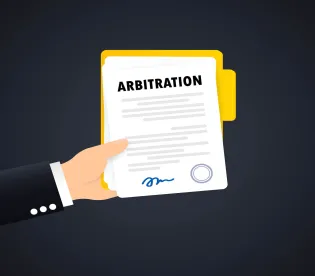In a May 23, 2022 unanimous decision, the United States Supreme Court ruled a showing that the other side has been prejudiced by a delay is not required for a party that has proceeded with litigation to waive its contractual right to arbitrate. The opinion, penned by Justice Elena Kagan, eliminates a circuit split where nine circuits — including the First, Second, Third, Fourth, Fifth, Sixth, Eighth, Ninth, and Eleventh Circuits — required a showing of prejudice, while two circuits — including the D.C. and Seventh Circuits — did not.
The case — Morgan v. Sundance, Inc., No. 21-328 — involves Robyn Morgan, an hourly employee who signed an agreement to arbitrate employment disputes when she applied for a job at a Taco Bell franchise owned by Sundance. Morgan filed a collective action lawsuit against Sundance for alleged violations of the Fair Labor Standards Act in the Southern District of Iowa. Despite the parties’ agreement containing an arbitration provision, Sundance defended the suit without invoking its right to arbitrate, including by filing a motion to dismiss that the court subsequently denied, filing an answer with 14 affirmative defenses (none of which referenced a right to arbitrate) and pursuing an unsuccessful mediation.
After eight months of litigation, Sundance moved to compel arbitration under the Federal Arbitration Act (FAA). The district court and Eighth Circuit applied their arbitration-specific rule providing that a party waives its contractual right to arbitrate if it knew of the right, “acted inconsistently with that right,” and “prejudiced the other party by its inconsistent actions.”
Despite applying this same standard, the district court and Eighth Circuit reached different outcomes. The district court determined Sundance knew of its right to arbitrate, which was in the company’s standard contract; Sundance acted inconsistently with that right by delaying its invocation of the arbitration agreement and engaging in litigation; and Sundance prejudiced Morgan with its inconsistent actions, forcing Morgan to defend against Sundance’s motion to dismiss. The district court therefore found Sundance waived its arbitration right. In contrast, the Eighth Circuit determined Sundance had not waived its arbitration right and did not unduly delay the litigation. Sundance’s motion to dismiss focused on a quasi-jurisdictional issue, with no indication that Morgan would later duplicate her efforts during arbitration, and the disposition of Sundance’s motion to dismiss lasted approximately four months, during which time there was no discovery.
The Supreme Court vacated the Eight Circuit’s holding that Sundance did not waive its arbitration right and remanded with instruction, declining to determine whether Sundance had in fact waived its right to arbitrate. The Supreme Court examined the role of the FAA’s liberal policy favoring arbitration in determining waiver. Federal courts previously required a showing of prejudice to the party asserting waiver and cited to the liberal policy favoring arbitration in support of this requirement. However, federal courts generally do not require a showing of prejudice to establish waiver in other contexts outside of arbitration. The Supreme Court explained that the FAA’s preference for arbitration does not provide an avenue for federal courts to devise special, arbitration-preferring procedural rules. The Supreme Court thus rejected a “bespoke rule of waiver for arbitration” and declined to demand proof of prejudice before finding the waiver of an arbitration right.
Instead, the Supreme Court reasoned that when evaluating waiver, “a court must hold a party to its arbitration contract just as the court would to any other kind” of agreement. The Supreme Court remanded the case to the Eighth Circuit for that court to consider whether Sundance “knowingly relinquish[ed] the right to arbitrate by acting inconsistently with that right” or to “determine that a different procedural framework” should be applied when evaluating waiver.
With this holding, the precise formula for waiver of a contractual right to arbitrate remains an open issue. The Supreme Court did not enumerate the exact prerequisites for establishing waiver of the right to arbitrate. The Eighth Circuit may adopt the standard proposed by the Supreme Court — knowing relinquishment — or may create a new framework as invited by the Court’s decision. Irrespective of how the Eighth Circuit rules, other circuits will not be bound by that holding and may implement their own standards so long as there is no requirement for prejudice to the party asserting waiver. It remains to be seen how the standard for waiver changes across circuits, and we expect further litigation across circuits on this issue. A “knowing relinquishment” standard, if adopted without further limitation, is a high bar that could create practical difficulties in future litigations.
Despite the uncertainty of the Supreme Court’s decision, the opinion suggests the focus has shifted away from the impact on the party asserting waiver. Given the Supreme Court’s guidance and the prior standard, we expect increased focus on the conduct of the party later invoking its right to arbitrate. The contractual right to arbitrate is not absolute, and to preserve its position a party should aim to act in a manner consistent with its contractual arbitration rights. A party acting against its right to arbitrate may forgo its opportunity to pivot to arbitration.
When responding to a complaint, defendants should review all relevant contracts and act in a manner consistent with the right to arbitrate when applicable and desirable to do so.
Caroline M. Poor contributed to this article.




 />i
/>i

